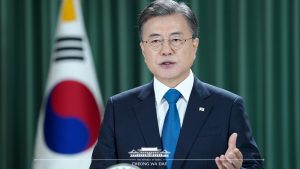Last month, Time Magazine released a cover photo of its July edition, featuring a photo of South Korea’s President Moon Jae-in. The title of the issue was announced to be “The Final Offer: South Korea’s Moon Jae-In Makes the Last Push for Peace with North Korea.”
Time also posted an online article describing the interview it conducted with Moon in June. Describing four years of Moon’s diplomatic efforts to negotiate peace and denuclearization in the Korean Peninsula, the article highlights the chronology of optimistic anticipation followed by disappointing setbacks and challenges, with the South Korean president engaging in a final effort to advance substantial diplomatic progress before the end of his presidential term next spring. The article then ends with a sobering reflection: “Moon’s True Legacy” might be a “grim realization that if he could not fix things, perhaps nobody can.”
Indeed, future South Korea presidents will likely face a similar diplomatic challenge as Moon has in achieving North Korea’s denuclearization. To make progress, South Korea must convince not one but four relevant actors to get on board. The challenge can be broken down into four separate statements Seoul will need to “sell” to its partners.
Convince the United States: “All foreign policy issues matter, but the North Korea issue urgently matters.”
Even setting aside controversial domestic politics, the U.S. government currently faces multiple foreign policy issues. Why should Washington prioritize North Korea when multiple global actors are urging the U.S. to instead focus on – to give just a few examples – Ukraine, Myanmar, Israel, Ethiopia, and Taiwan? Many U.S. policymakers and experts are likely willing to settle for “freezing” the North Korea issue so that Washington could move on to other, hopefully, more easily achievable, foreign policy issues.
To make progress, a South Korean president – Moon or his successor – will need to convince the United States that peace in the Korean Peninsula is a top-priority agenda item.
Convince North Korea: “Denuclearization is not a slippery slope to regime change.”
Currently, Pyongyang’s biggest priority is its regime security. Would the United States (and South Korea) be satisfied only with North Korea’s denuclearization? Or would Washington pressure a denuclearized North Korea to implement political liberalization and subsequently regime change? Would it not be safer for Pyongyang to conserve some of its nuclear arsenal, just in case a hardline government comes to power in the United States or South Korea in the future?
Can Seoul convince Pyongyang that so long as the latter agrees to denuclearization, neither South Korea nor the U.S. plans to intervene in the North’s domestic political affairs (even though the U.S. is currently “meddling” already in China’s domestic affairs)?
Convince South Koreans: “In diplomacy, there is sincere friendliness and calculated courtesy.”
Many South Koreans have expressed frustration, even anger, that the Moon government has often displayed overt friendliness toward the North Korean regime. During an interview with Time, Moon even complimented Kim Jong Un as “very honest and very enthusiastic,” causing domestic criticisms. As a former human rights lawyer and a former special force veteran, critics said, how could Moon not acknowledge the severity of military provocations and human rights atrocities committed by the Kim regime?
On the other hand, not just Moon but future South Korean presidents (even those from conservative political orientation) might encounter situations where they would have to compliment North Korea’s leadership and exchange diplomatic pleasantries to improve diplomatic relations (similar to how Presidents Putin and Biden, despite their animosity, outwardly exchanged personal compliments before and during the Russia-U.S. summit). In such situations, the next president will have to reassure South Koreans that Seoul is only engaging in a “calculated friendliness” toward the North, and at heart, of course, retains its moral criticism toward the latter regime.
Convince China: “A clean lip is better than a swollen lip.”
China often uses the idiom “as close as lips and teeth” to describe its support for North Korea – a “lip” that protects the “teeth” (China). Amid the increasing China-U.S. rivalry, China appears more determined than ever to protect its North Korean ally.
Any future South Korean president will have to convince Beijing that it is better for China’s own interest, however, to have a “clean lip” over a “swollen lip” (or a “loose lip”). Impetuous actions and rhetoric from North Korea could hinder China’s sensitive and prudent maneuvering against the United States. (Just as Austria was more a hindrance than a help for Kaiser’s Germany during World War I). At the same time, Seoul will also have to convince China that the South is not trying to manipulate discord between the “teeth and the lip.”
A political scientist, Robert Putnam, has discussed in the past the intricacy of “two-level games” in international diplomacy. Moon, however, has to handle even more intricate “five-level games” (and that’s without even mentioning Japan and Russia) in his negotiations for peace in the Korean Peninsula. And it is a diplomatic game that the next South Korean president likely cannot abstain from, partly because Seoul lacks the strength to resolve the issue unilaterally, but also because there are multiple, opposing perspectives within and outside the country on how the issue of North Korea’s denuclearization should be resolved.
In a slight contrast with the conclusion of the Time article, my observation is that Moon’s “true legacy” might be “a grim realization” that peace in the Korean Peninsula cannot be advanced by the resolve of a South Korean president alone.
Future South Korean presidents must carefully study the lessons from Moon’s diplomatic negotiations. South Korea is not a hegemon, and it is therefore the unavoidable fate of a South Korean president to convince countries and people who are not easily convincible.

































